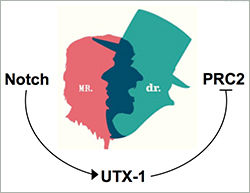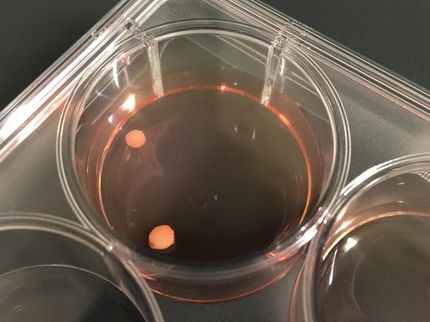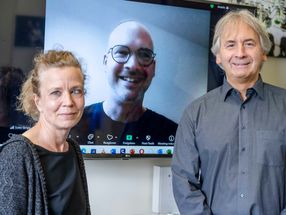Researchers find local environment directly influences adult stem cell reservoirs
Using the common fruit fly, researchers at UT Southwestern Medical Center have discovered that an intricate set of signals released by stem cells' surroundings governs their maintenance.
These findings, available online and in Current Biology, will aid stem cell researchers in understanding and potentially manipulating the delicate environments that promote adult stem cell formation, said Dr. Dennis McKearin, associate professor of molecular biology and associate dean for the Medical Scientist Training Program at UT Southwestern and senior author of the study.
UT Southwestern researchers have found that blocking a specific protein in fruit flies ensures that stem cell populations remain intact. Dr. Dahua Chen and Dr. Dennis McKearin believe that this work will aid researchers in understanding and manipulating stem cell biology.
The reproductive system of the female fruit fly, as in humans, contains a reservoir of adult stem cells. When the stem cells divide, they create two daughter cells, each with a distinct fate. One daughter travels away from the reservoir, divides further, and eventually becomes the egg and 'nurse' cells, which nourish the egg. The other daughter stays near the other stem cells and is influenced by the local environment to remain a stem cell, thereby maintaining the stem cell population.
Dr. McKearin's research shows that within the local environment, or niche, of the stem cell population, stromal cells, the non-stem cells that surround and attach to stem cells, release signals that are received and processed by stem cells and the daughters remaining in the niche. These molecular signals block certain genes from becoming active in the remaining stem cell daughters, preventing them from becoming any other kind of cell.
Genes controlling differentiation are turned off in some stem cell daughters but turned on in others, which move too far away to be influenced. Thus they develop into the egg and nurse cells.
The success of this cell-to-cell communication is crucial. When the signals from the stromal cells are blocked, the stem cell population is gradually lost. When the signals are on all the time, or specific genes in the daughter cells are mutated, every daughter cell acts like a stem cell and the future eggs are lost. Dr. McKearin said that in addition to their influence on stem cells, local environments or niches may influence the spread of cancer.
The study was funded by the National Institutes of Health.
Most read news
Organizations
Other news from the department science

Get the analytics and lab tech industry in your inbox
By submitting this form you agree that LUMITOS AG will send you the newsletter(s) selected above by email. Your data will not be passed on to third parties. Your data will be stored and processed in accordance with our data protection regulations. LUMITOS may contact you by email for the purpose of advertising or market and opinion surveys. You can revoke your consent at any time without giving reasons to LUMITOS AG, Ernst-Augustin-Str. 2, 12489 Berlin, Germany or by e-mail at revoke@lumitos.com with effect for the future. In addition, each email contains a link to unsubscribe from the corresponding newsletter.


























































